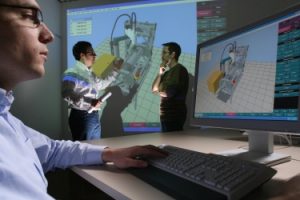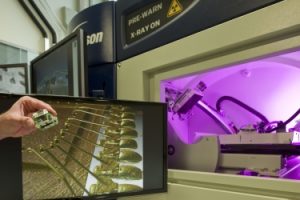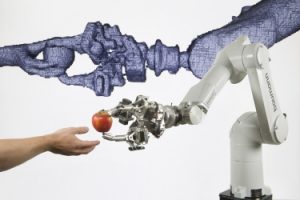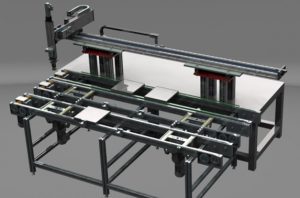The E|SYS demonstrator is an examination object for researching the automation of industrial plants against current trends such as Industry 4.0. Further motivators are also the digitalization of production and information technology integration. Ultimately, this is intended to represent and demonstrate intelligent assembly scenarios, such as the independent determination of the assembly sequence while ensuring high transparency, variability and scalability. This development towards computerization thus results in the assembly cell’s ability to change and learn.
The demonstrator installation is intended to help demonstrate the range of the research areas Engineering Systems (E|SYS) and Automated Production Systems (A|PS) and to offer guests and (potential project) partners the opportunity to make the research contents “tangible”. The facility is primarily intended to cover the following topics
- Integrated engineering
- Integrated planning and simulation
- Digital (process) planning
- Automated knowledge management
- Resource efficiency and energy flexibility.
Challenges addressed by the industry
On the basis of selected application cases, abstract challenges of the industry, such as ensuring the required quality, increasing productivity, shortening the time to market or the increased flexibility and changeability of automated production plants can be illustrated and possible solutions from science and research can be illustrated. Defined scenarios for which use cases are to be established and implemented in the demonstrator:
Integrated engineering
The integrated engineering comprises all sub-steps of agile simultaneous engineering of the domains mechanics, electrics/electronics and software and additionally covers the topics virtual commissioning and safeguarding as well as dynamic live linking of real plant and digital model.
Dynamic self-configuration
The demonstrator is intended to be a testing ground for the implementation of flexibility and changeability of automated production systems through self-X properties. This requires a continuous, uniform and semantic description of the system and its components. By fulfilling these requirements, the implementation of plug and produce paradigms on component level shall be achieved.
Industrial Internet of Things and Services
Digital services for production systems and products play a central role in the industrial Internet of things and services. The consistent application of architecture paradigms such as SoA or the implementation of services in independent microservices as well as the platform-independent porting into software container platforms such as dockers enable the efficient implementation of distributed analysis and optimization tools. In addition, knowledge-based services are to be used for the evaluation of plant conditions or for decision making.
Human-Machine Collaboration
The use of augmented and virtual reality hardware at workstations in production and assembly, as well as the integration of wearables in the shop floor, should help people to understand and grasp the increasingly complex and intricate systems and processes. With the help of various use cases, such as manual assembly processes or condition monitoring in the context of maintenance, various technologies are being tested and further developed. An essential aspect of the assistance systems to be developed is platform independence.
In order to be able to depict the described scenarios in use-cases, different components are combined into a complete system with the help of the system and the associated engineering environment. These include:
- the manufacturing cell per se as a mechatronic system consisting of a flexible transport system and modular (virtual) machining stations,
- the engineering workstation with the Siemens tool chain for further development,
- the analysis workstation for visualization and optimization of the operation and
- the infrastructure and software for the cloud-based collection and analysis of energy consumption.
Contact:
Florian Faltus (M. Sc.)
Jonathan Fuchs (M. Sc.)







